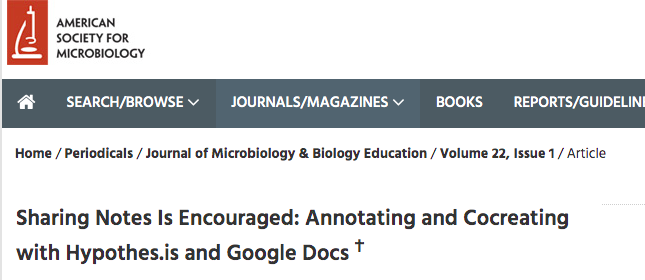Press
Hypothesis in the news.
Read what others are saying about our powerful social annotation solutions. For press inquiries, please contact us.
ProfWeb
18 April, 2021
Hypothesis is a free open-source platform that not only provides students with a different way to demonstrate they’ve done the reading but more importantly allows students to work together to share information and build on the work of others.
IDEA Knowledge
15 April, 2021
Hypothes.is is an open source tool/plugin for social, collaborative asynchronous annotation. Collaborative annotation is an effective methodology that increases student participation and engagement, expands reading comprehension, and builds critical-thinking skills and community in class. Annotation can also increase faculty, student and cognitive presence in classes. Annotating together makes reading visible, active, and social, enabling students to engage with their texts, teachers, ideas, and each other in deeper, more meaningful ways.
Chapman University
5 April, 2021
Why is Hypothesis great for students? The annotations help students focus on the important points of the reading, which is especially useful with dense and detail-heavy texts. Because they can read one another’s annotations, students can benefit from seeing how other students have made sense of the reading. If you make each annotation worth very little of the grade, students experience less stress and anxiety when completing them.
Duke Learning Innovation
19 March, 2021
The documents the class has annotated with Hypothes.is are diverse, ranging from book chapters and published articles, to websites and video transcripts, to even their class syllabus.
“Annotating the syllabus allows students to add comments and questions to the course plan,” Gould said. “Annotating the syllabus live, in-class gives us an opportunity to openly discuss any confusing bits, and it opens conversation about particular aspects of the class. Students can add values statements and clarifying points to the inclusion statement, for instance, or ask questions about the collaborative grading system.”
American Society for Microbiology
29 January, 2021
Participants annotate articles using the web-annotation tool Hypothes.is and have access to comments from their peers. Groups are then assigned to summarize the annotations and findings, posting a synthesis for the course’s Hypothes.is group. In parallel, students contribute to common notes. The instructor generates a weekly video discussing the student notes. The goal of these activities is to foster an environment of open annotation and co-creation of knowledge to aid in studying for deeper learning. Compiled notes can be used to create an open educational resource (OER). The OER provides an entry point for future students and the public. Based on the evaluation of annotations, notes, and assessments, we conclude that these activities encourage student engagement and achievement of learning outcomes while raising awareness of the importance of open and collaborative practices.
Ethical ELA
10 January, 2021
The 21st Century offers new options for this kind of connecting. A free, open annotation app, Hypothes.is, offers a similar and expanded experience in the margins of digital texts. Readers can collaboratively annotate web-based content, respond to other readers, and add additional resources and links. This digital, social space offers the potential of conversations and insights into the text, which my students started referring to as a “ discussion before the discussion.”
Hastac
20 October, 2020
There are other great digital annotation tools out there like Hypothesis (check out this excellent webinar) and Manifold.
University of Arizona Digital Learning
12 August, 2020
Social annotation may be what you are looking for to take make your readings more relevant, interactive, and meaningful for your students. Social annotation is taking the private notes and highlights that we make as a part of our close reading of a text and turning them public. In making the annotations public within our courses, students are able to point out areas where they are confused, make comments and observations, and have conversations and discussions in context. Social annotation tools also present unique opportunities to make connections, provide enhancements and give students some much needed writing and research support.
Crystal Rose-Wainstock
12 August, 2020
Engaging students in discussions about global issues can be challenging in the language classroom. Due to time constraints and uncertainty about how to introduce and facilitate discussions about sensitive topics, some instructors may shy away from asking students to think critically about what is happening in the world around them. Whether within the context of online classes during a global pandemic or a more traditional face-to-face classroom, social reading and annotation can be one avenue for inviting students to discuss global issues within the context of authentic online texts.
Harcum Libguides
4 August, 2020
Hypothes.is is a web-based social annotation tool. It allows you and your students to highlight and comment/annotate/discuss web pages or pdf articles directly on the text. Sort of like digitally writing in the margins. This tool would be extremely useful to get students to complete their reading assignments, think critically about their readings and engage in class discussions.









